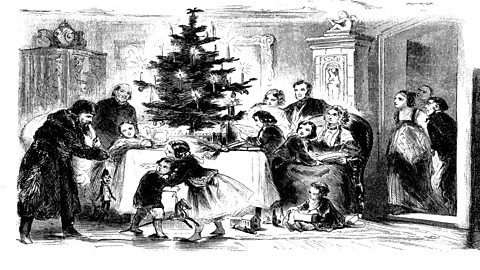There are some wonderful old wintery words that have worked their way out of our vocabulary – and we think it’s about time we brought them back into circulation. Here are a few of our favourite old-fashioned festive vocables,

1. Waissail
A spiced mulled cider, Waissail was traditionally drunk on Twelfth Night. Revellers would serenade or “waissail” the trees in the orchard, in a custom intended to ensure a fruitful harvest.
In a sentence: “Pour me a glass of waissail, I’m off to waissail at neighbours.”The same word can also be used to mean drinking large amounts of alcohol and enjoying oneself with others in a noisy, lively way, or to go from house to house at Christmas singing carols. Cider is of course helpful for all the above.
2. Kissing bough
 A precursor to mistletoe, the kissing bough was a popular Christmas decoration in Tudor homes. A round ball of twigs and foliage, decorated with seasonal fruit such as apples, it was often hung on walls or over doorways as a gesture of goodwill, and to welcome guests into the home. The boughs gave birth to the ritual of kissing under the mistletoe, first documented in the 16th century.
A precursor to mistletoe, the kissing bough was a popular Christmas decoration in Tudor homes. A round ball of twigs and foliage, decorated with seasonal fruit such as apples, it was often hung on walls or over doorways as a gesture of goodwill, and to welcome guests into the home. The boughs gave birth to the ritual of kissing under the mistletoe, first documented in the 16th century.
In a sentence: “Pop under the kissing bough, Janet, and let’s have a snog.”
3. Bubbly-jock
 Bubbly-jock, or bublie-cock, is an old Scots word for a male Turkey. Treasure Island author and famous Scot, Robert Louis Stevenson, once wrote in a letter: “ At table I was exceedingly funny, and entertained the company with tales of geese and bubbly-jocks”.
Bubbly-jock, or bublie-cock, is an old Scots word for a male Turkey. Treasure Island author and famous Scot, Robert Louis Stevenson, once wrote in a letter: “ At table I was exceedingly funny, and entertained the company with tales of geese and bubbly-jocks”.
In a sentence: “That bubbly-jock is never going to fit in the oven, we’ll have to barbeque it.”
4. Crawmassing
Not happy with your prezzies this year? Why not do a spot of crawmassing, which means to go around begging gifts at Christmas. It also means to gather up, or go through the remnants of a festive feast. No point wasting those last few sprouts.
In a sentence: “Oh dear, your Auntie Barbara is crawmassing again.”
5. Snow-broth
A 16th century word for melted snow, icy water or slush. It features in Shakespeare’s play Measure for Measure: the character Lucio describes Lord Angelo as “a man whose blood is very snow-broth”, implying that he has no sexual appetite.
In a sentence: “No chance of going sledging I’m afraid – it’s just snow-broth out there.”
6. Bummock
Having a party? Then it’s time to brew a bummock. It’s an old Scots word for a large quantity of drink, purposely prepared for a festival or special occasion – in particular Christmas. In the 18th century a bummack, or bummock, was also the name given to a Christmas party given by landlords to their tenants.

In a sentence: “Can you make it to my bummack? I’m brewing a bummock!”
7. Waits
From as early as the Middle Ages, almost every town and city in the UK had a band of musicians and singers called waits. Their duties included waking the townspeople on dark winter days by playing in the streets, and welcoming Royal visitors by performing at the town gates.
Waits were abolished in 1835, but the term became associated with any group of singers or musicians who sang and played carols around their town or village at night, over the Christmas period, whilst collecting money. In other words, carol singers.
In a sentence: “Bob, come to the door – the Christmas waits are here!”
8. Blenky
Forget a smattering of snow – what about a blenky? The long-forgotten word means “to snow sparingly” and is probably derived from blenks, an 18th century word for ashes or cinders. The light snow resembles the blenks or ashes that can fly out of a chimney and settle on the ground.
In a sentence: “It’s forecast to blenky tonight. Don’t forget your scarf.”
9. Rumball
Rumball or Rumball Night is an old 18th century name for Christmas Eve. A rumball is also a feast served up on December 24th, rather than Christmas Day itself.
In a sentence: “Remember to put mince pies out for Father Christmas on Rumball.”
No comments:
Post a Comment